Which crossover SUV is better?
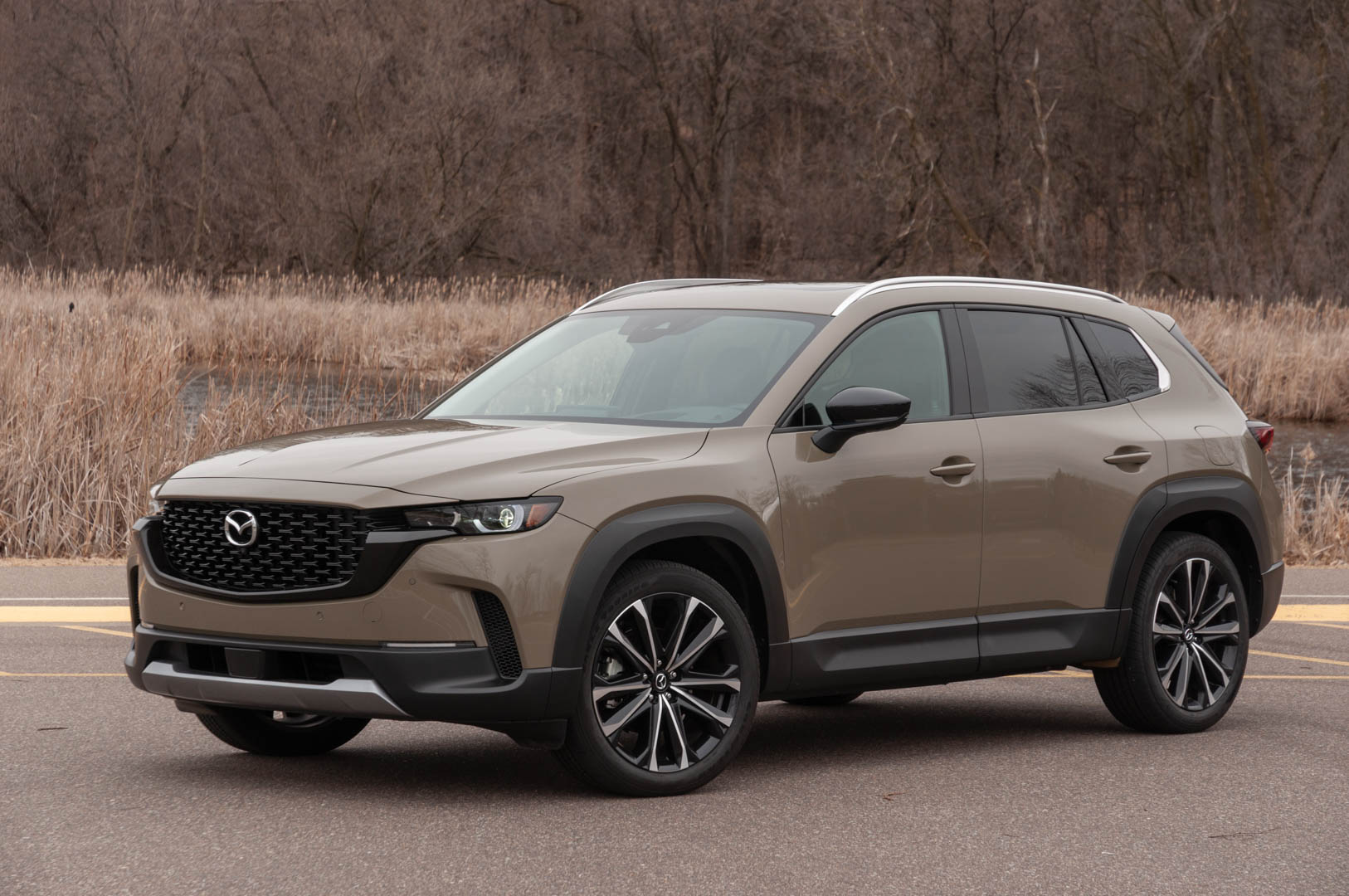
Mazda CX-50 versus Toyota RAV4: These two compact crossover vehicles are more similar than different, making it a tough choice for the one that earns your money. The CX-50 leans into the premium segment with its refined interior, but it chases the bestselling RAV4 and its hybrid options. The difference comes down to look and the power—and powertrains—of choice.
The 2023 Mazda CX-50 outgrows the smaller CX-5 that has been Mazda’s bestseller for years. It’s larger, roomier, and roughens up the urbane style of the CX-5 for something a bit more American. The 2023 Toyota RAV4 set the bar for compact crossovers, and continues to improve on its choice of gas, hybrid, and plug-in hybrid powertrains with improved in-car tech and 13 trim options, ranging from the basic to the luxurious. It casts a wide net, and Mazda clearly wants some of Toyota’s catch, even as it risks overshadowing the alluring but aging CX-5.
Which one is better, the stalwart or the newcomer? More importantly, which one is a better car for your needs? Here’s how they compare, by category.
2023 Toyota RAV4
Mazda CX-50 vs. RAV4 price and trims
-
Mazda CX-9 starts at $29,000 and climbs to nearly $45,000
-
RAV4 ranges from $29,000 to above $50,000 for a loaded Prime
-
Best picks: CX-50 2.5S Premium, Toyota RAV4 Hybrid
How much is a Mazda CX-50? Which CX-50 should I buy?
Taking a page from Toyota’s deep playbook, the Mazda CX-50 comes with a choice of two powertrains across 10 trim levels. Because it comes standard with all-wheel drive, whereas Toyota charges $1,400 extra, the CX-50 is a better value given the comparative features. It comes standard with good driver-assist tech, keyless start, cloth upholstery, and an 8.8-inch touchscreen with wireless Android Auto and Apple CarPlay. Toyota has the advantage on in-car technology because Mazda insists on a console-mounted controller dial as the main interface with the far-to-reach touchscreen.
Options range from a larger 10.3-inch touchscreen to a 10-speaker Bose audio system, leather seats, power front seats that are heated, and a panoramic sunroof. Those features come on our recommended pick, the $37,000 2.5S Premium. Unless you want the more potent turbocharged engine in the 2.5 Turbo for $2,000 more.
A $41,000 Meridian Edition with the 2.5 Turbo challenges the off-road leaning RAV4 TRD models, and adds all-terrain tires to its 18-inch alloy wheels, as well as side rockers, a hood decal, and a special beige leather inside that Mazda calls Terracotta.
The top 2.5 Turbo Premium Plus costs nearly $44,000, and stretches Mazda into the premium space alongside Lincoln, Lexus, and Genesis. It has a surround-view camera system, a heated steering wheel, heated rear seats, wireless smartphone charger, front and rear parking sensors, navigation, and steering support for blind-spot monitors.
How much is a Toyota RAV4? Which Toyota RAV4 should I buy?
Even the nicest RAV4 can’t match the nicest CX-50, but aside from the plug-in hybrid Prime models, Toyota doesn’t charge as much on the top end. Thirteen trim options, and a huge span in prices drives Toyota RAV4 owners from $29,000 mark to more than $40,000 for the Hybrid Limited, but the base LE models pack a value with any powertrain. It has 17-inch wheels, adaptive cruise control, cloth seats, and an 8.0-inch touchscreen with wireless Apple CarPlay and Android Auto.
The Hybrid powertrain in LE, XLE, SE, XLE, XSE, and Limited grades cost about $2,750 more on average than their gas counterparts. The best powertrain in the RAV4 family—most efficient, most powerful, most fun to drive—belongs to the RAV4 Prime plug-in hybrid. The Prime SE costs about $43,500, or about $9,000 more than the Hybrid SE. The Prime XSE tops the RAV4 lineup at just under $48,000, but adding the Premium package for an onboard charger, head-up display, panoramic sunroof, heated rear seats and other comforts takes the price beyond $50,000, which is beyond our comfort for a RAV4.
As much as we prefer the efficient powertrain of the RAV4 Prime, and its 42 miles of all electric range that’s perfect for around town, we understand plugging it in at night might not appeal to everyone, or its price tag. In that case, we recommend the $34,000 XLE Hybrid RAV4 as the AWD budget buy.
Advantage: CX-50 for gas only, Toyota for hybrid and plug-in hybrid options.
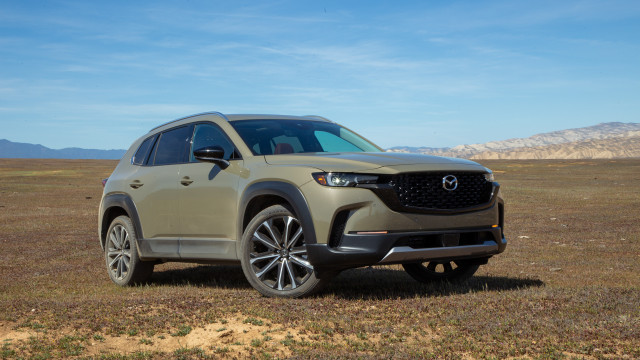
2023 Mazda CX-50
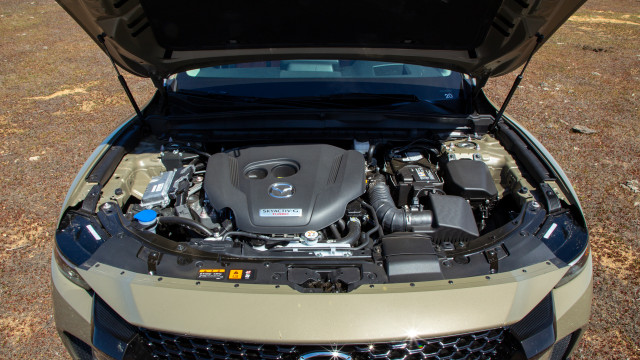
2023 Mazda CX-50
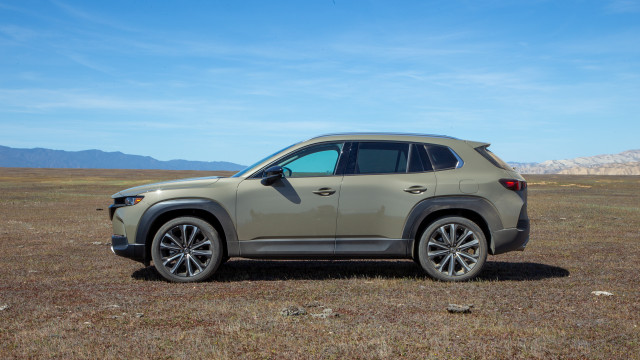
2023 Mazda CX-50
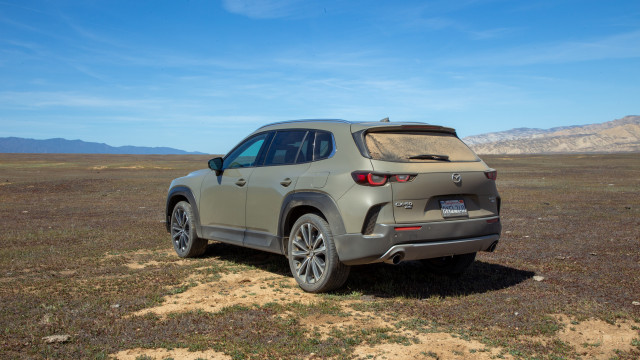
2023 Mazda CX-50
RAV4 vs. CX-50 towing, touring, and performance
-
Mazda CX-50 excels at handling and steering
-
RAV4 has good if not dull manners
-
RAV4 Hybrid and Prime present a more compelling choice
Is the Mazda CX-50 4WD?
The CX-90 rolls out with standard all-wheel drive and a 6-speed automatic transmission routing power from the 2.5-liter inline-4. The engine makes 187 hp and 186 lb-ft of torque. It’s fine. The 6-speed lets it rev higher, so there’s more power available once off the line, but that can also make it louder inside the cabin. Sport and Off-road modes tweak the throttle response, and the latter allows for more low-end torque and brake-based torque vectoring for modest off-road capability.
The available 2.5-liter turbo-4 brings more of that Mazda verve. Its 227 hp and 310 lb-ft (on regular gas; with 93-octane fuel, it’s 256 hp/320 lb-ft of torque) makes the 6-speed feel more appropriate, but it can still lag from a stop, even in Sport mode. From about 2,000 rpm and up, it packs a satisfying punch that turns on-ramps and merging into something fun.
Like other Mazdas, the charm shines in its steering and ride. It cruises in comfort, and its front strut and torsion beam rear suspension keeps it just right, neither too firm nor too soft. It’s not meant for hard cornering, and it’ll respond like a slap to the jowls. The electric-assist steering also keeps the CX-50 true without the need for frequent corrections.
Is the Toyota RAV4 4WD?
The RAV4 comes with front-wheel drive or optional all-wheel drive that’s standard on Hybrid, Prime, TRD Off-road, and Adventure grades. Non-hybrids feature a simple power split front to rear, while Hybrid and Prime RAV4s use a second motor to power the rear axle, while the engine and primary motor power the fronts.
The RAV4 has more gumption coming from its 203-hp 4-cylinder and it pairs to an 8-speed automatic, but that doesn’t make it any quieter than the CX-50. It might even be louder and buzzier when pushed. The 219-hp Hybrid pairs that engine to its two-motor system and a CVT that encourages more efficient driving and enables electric-only power under light throttle. The RAV4 Prime puts out the most power at 302 hp, making it the most potent non-sports car in Toyota’s lineup. The engine pairs with two motors fed by an 18.1-kwh battery pack that helps the RAV4 hit 60 mph in 5.7 seconds while generating pure electric driving range.
The battery, though, gives it a heavy feel on the road, though it still steers with clarity and has a well-tuned ride. All RAV4s have better steering and handling than the vehicles that bore the nametag a few years ago.
Advantage: CX-50 tops the base RAV4, but not the RAV4 Hybrid and Prime.
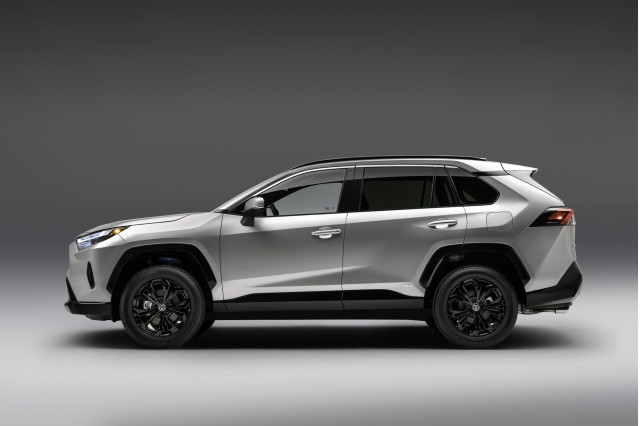
2023 Toyota RAV4
RAV4 vs. CX-50 fuel economy
-
Mazda’s 6-speed automatic isn’t helping
-
RAV4 gets at least 28 mpg combined
-
RAV4 Prime has 42 miles of plug-in range
Is the Mazda CX-90 good on gas?
The CX-90 gets below average fuel economy for the compact crossover class. More gears in its transmission might keep its revs lower to operate more efficiently. Even with standard all-wheel drive, it trails the Subaru Forester, Honda CR-V, and rivals by at least 2 mpg combined with AWD. Here are the EPA ratings.
-
2.5-liter gets 24 mpg city, 30 highway, 27 combined
-
2.5-liter Turbo gets 23/29/25 mpg
Is the Toyota RAV4 good on gas?
Yes, and it only gets better with Hybrid and Prime plug-in hybrid models. The hybrids come with standard all-wheel drive, whereas the base inline-4 and 8-speed automatic keep it calm and efficient. Limited and TRD Off-road models lose 1 mpg compared to the AWD base model because of wheel and tire sizes, or additional vehicle weight.
-
Base inline-4 gets 27/34/30 mpg in most configurations; AWD costs it 1 mpg
-
RAV4 Hybrid AWD gets 41/38/40 mpg; Hybrid AWD Woodland drops to 38/35/37 mpg
-
RAV4 Prime has 42 miles of electric range; with engine and motor power, it gets the equivalent of 94 mpg combined; on engine power alone it gets 38 mpg combined.
Advantage: The RAV4, dwarfed by better Hybrid and Prime models.
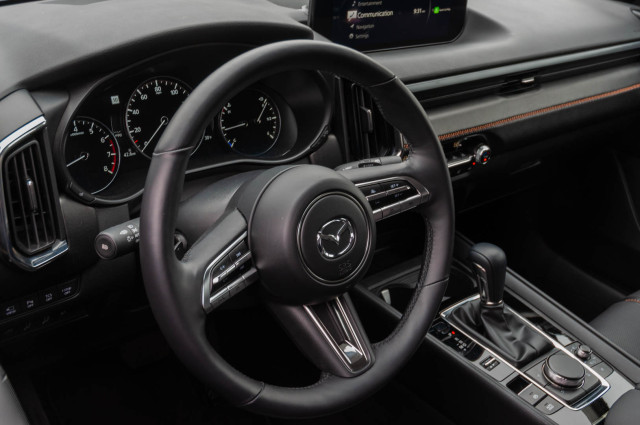
2023 Mazda CX-50 Turbo Premium
Mazda CX-50 vs. RAV4 safety
How safe is the Mazda CX-50?
According to the IIHS, it has top crash-test ratings, good headlights, and a Top Safety Pick+ award. All models have automatic emergency braking, active lane control, blind-spot monitors, automatic high beams, and adaptive cruise control down to a stop. Outward vision to the rear is not so good, though, so consider the available surround-view camera system and parking sensors.
How safe is the Toyota RAV4?
It’s safe, but misses the highest honor from the IIHS and settles for a Top Safety Pick because it didn’t ace the updated side-impact test. It gets five stars from the NHTSA, which is behind the times on its criteria compared to the IIHS. Toyota matches the driver-assist tech in the CX-50 with standard automatic emergency braking, automatic high-beam headlights, active lane control, and adaptive cruise control. It has the same rear vision issue because of thick roof pillars.
Advantage: The CX-50, but the safety tech in both is better than most rivals.
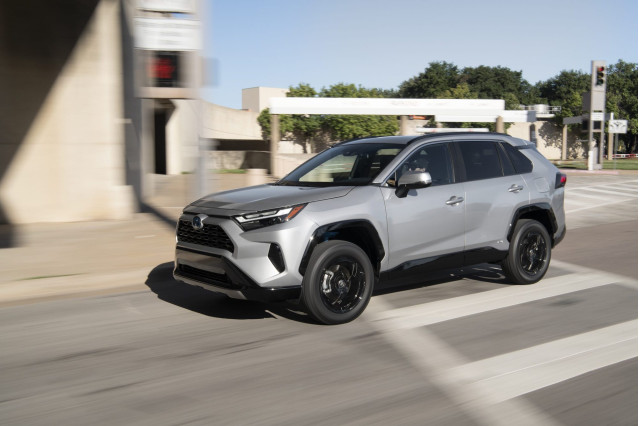
2023 Toyota RAV4
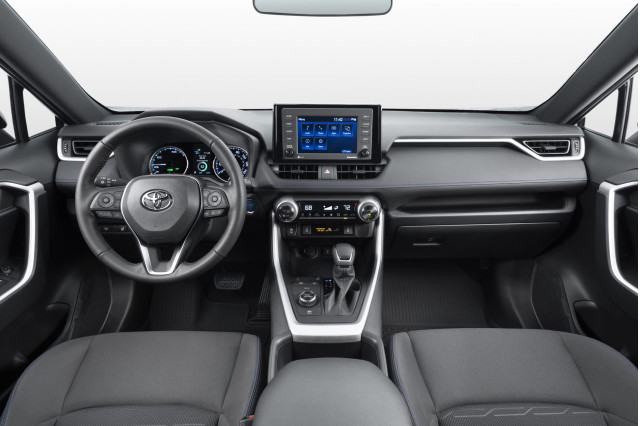
2023 Toyota RAV4
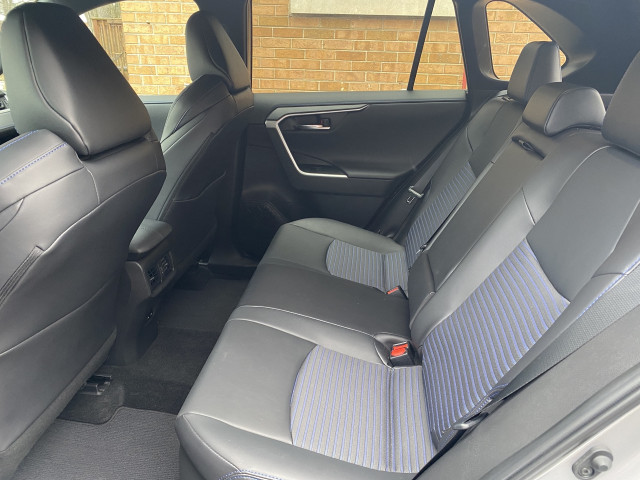
2023 Toyota RAV4 Hybrid XSE AWD
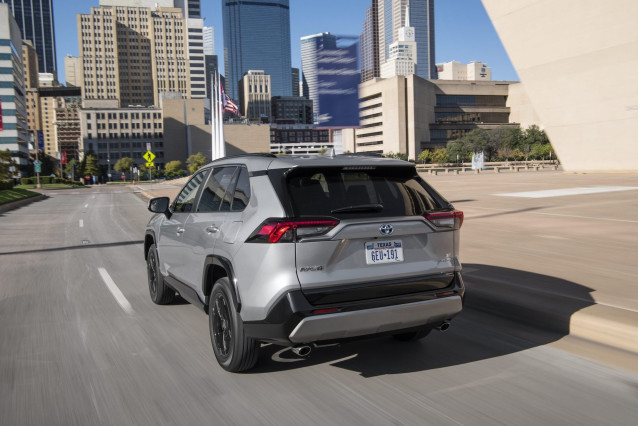
2023 Toyota RAV4
RAV4 vs. CX-50 size, space, and cargo capacity
-
CX-50 is larger than the CX-5 but not quite as spacious as the RAV4
-
The CX-50’s cargo holds 31.4 cubic feet versus 37.0 cubic feet in the RAV4
-
But CX-50 has more rear legroom at 39.8 inches vs. 37.8 inches in RAV4
How big is the Mazda CX-50?
Dimensionally, it’s as if Mazda designers benchmarked the RAV4, but squeezed a little more passenger space out of it. It’s 4.3 inches longer, and has a wheelbase that’s nearly five inches longer. That translates to greater interior space and roomier seating for four; the fifth seat could be used for young road trippers or anyone else who doesn’t know better. That’s par for the class.
The front seats support all frames, and most models have power adjustments and seat heaters. It’s best dressed in leather upholstery and the overall fit and finish give it a luxury vibe when still. In motion on the highway, it lets in a good amount of tire and wind noise. It’s 5.3 inches shorter in height than the RAV4, yet the raked windshield and high-mounted seats of the RAV4 could crimp taller passengers, especially with the sunroof option.
How big is the Toyota RAV4?
It’s bigger by interior volume, but that’s due to the cargo hold and its 37.0 cubic feet of space versus the 31.4 cubes in the CX-50. Mind, the Prime has slightly less space due to its battery placement in back. Toyota optimizes the interior better than Mazda with clever storage spaces such as wide enough door pockets to hold fat water bottles and a dash shelf great for smartphones, transponders, cassette tapes.
Toyota has improved on the RAV4’s interior, with mid- to top trims and hybrid models sporting comfy bucket seats with power adjustments. It can be trimmed out to premium grade as well, but the CX-50 does it a bit more naturally and thoroughly.
Advantage: The CX-50 passenger space is roomier, nicer.
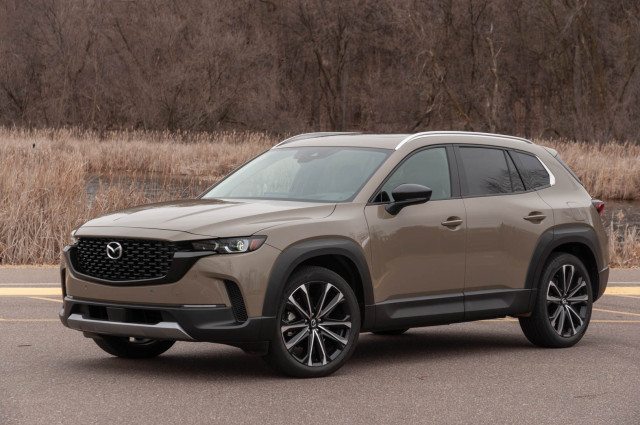
2023 Mazda CX-50 Turbo Premium
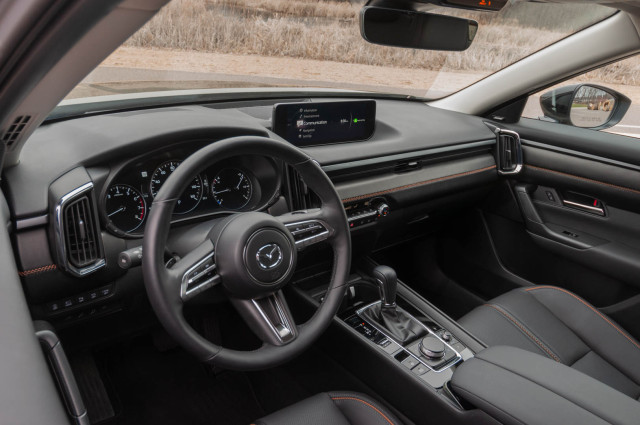
2023 Mazda CX-50 Turbo Premium
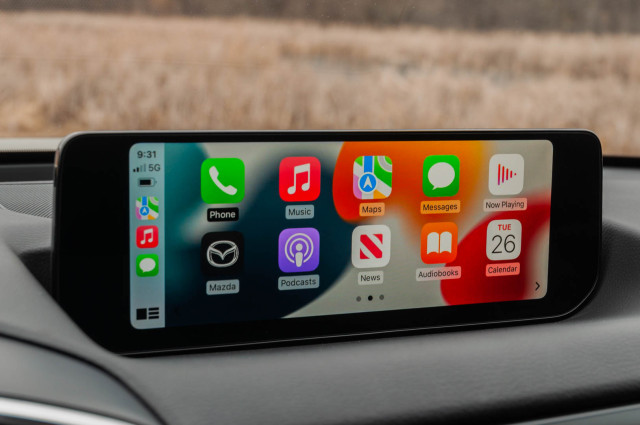
2023 Mazda CX-50 Turbo Premium
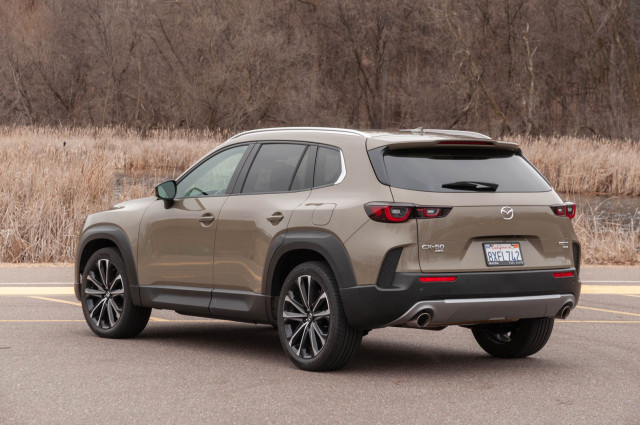
2023 Mazda CX-50 Turbo Premium
CX-50 vs. RAV4 styling
-
CX-50 tries to look more like the RAV4 than the CX-5
-
RAV4 continues to break the mold
-
Both interiors can lean luxury
Is the Mazda CX-50 a good-looking car?
The CX-50 sheds the smooth grace of the CX-5 to appeal to more American tastes for bigness, boldness, and moreness. It’s by no means ugly, but neither is it striking. With its broad, wide grille, cladded bulging fenders, fake air intakes, and squared off ends, it fits in more than stands out.
The interior carries more distinction with a clean dash and neat center screen underscored by climate buttons. Available leather upholstery with tasteful contrast stitching make its mark.
Is the Toyota RAV4 a good-looking car?
Toyota can match that interior design on top and hybrid trims. There’s a bit more going on inside, with an eye toward functionality, but it has matured from the utilitarian RAV4 of the past.
The exterior wears more daring design elements, as if it knows the competition has it marked as top dog. It marries Tacoma and 4Runner DNA, with a blunt front end and bold fenders. It flexes some creases and folds, but doesn’t overdo it.
Advantage: RAV4.
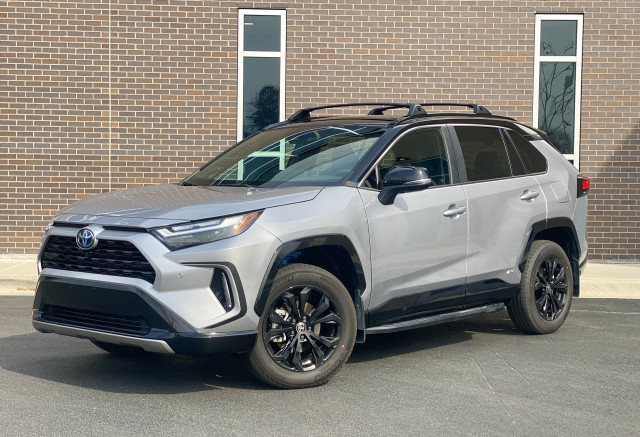
2023 Toyota RAV4 Hybrid XSE AWD
Which is better: Mazda CX-50 or Toyota RAV4?
Well, it’s a draw. Both models earn a TCC Rating of 6.5 out of 10, but they go about it differently. (Read more about how we rate cars.) The RAV4 has a better fuel economy rating, and that’s without factoring the hybrids, whereas the CX-50’s warranty and feature list outpoints the RAV4. Even our editorial team disagrees on the style rating, and ultimately they’re so closely matched it’ll likely come down to a gut feel.
Winner: Our gut says the RAV4 Hybrid.
https://www.thecarconnection.com/news/1139383_mazda-cx-50-vs-toyota-rav4-which-crossover-suv-is-better Which crossover SUV is better?




